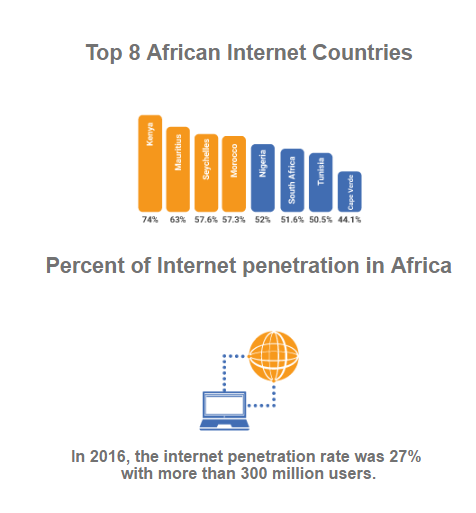Steady growth of internet penetration in Africa a boost for e-tourism

The growth of 4G networks has also extended to more than half of African countries, with 72 live LTE (Long-Term Evolution) networks in 32 countries as at mid-2016. Although its adoption still lags behind the rest of the world with only 20% 4G population coverage, taking advantage of 4G solutions currently in the market will provide more efficiency and convenience to any e-tourism business.
For instance, the report identifies Wi-Fi as a top priority preference for hotel guests in Africa with 23% demand. For this group of travellers, most likely those who take up 31.4% of business spending are looking for a fast and reliable network connection and a huge amount of bandwidth to ensure their dealings continue uninterrupted. Investing in 4G, therefore, can help hotels provide more personalised guest experiences as well as improve operational efficiency.
Mobile services and technologies generated 6.7% of GDP in Africa (around $150b of economic value). This is expected to increase to more than $210b (7.6% of GDP) by 2020, while the number of unique subscribers is estimated to reach 725m.
In this case, the more connected Africa becomes, the more likely the pressure will be on service providers in the tourism and hospitality industry to adopt the internet and rip from its massive advantages. Capitalising on technological advancements presented by the invention of the internet as well as its massive penetration on the continent is sure to give players like hoteliers a competitive edge. Possible direct ROI is expected from increased bookings from new and return customers.

A notable fact from the hospitality report is that low levels of digital skills remain a major barrier to mobile internet adoption, especially in sub-Saharan Africa. Tourism stakeholders supporting digital literacy on the continent is, therefore, an essential element in promoting e-tourism in Africa. In its aim to connect the whole world to the internet, Facebook launched its Free Basics initiative in 2016 - connecting almost half the African countries to its free internet service. Furthermore, African Union recently launched the Africa domain name for the continent, a move that gives Africa its digital identity and aims to decrease the cost of acquiring a URL which then allows people and businesses to better reach the world.

About Josephine Wawira
Josephine Wawira is a consultant in communication and public relations with over six years of progressive writing and broadcast experience. She is currently a writer for Africa's online hotel booking portal, Jumia Travel, focusing in the areas of travel, tourism, and hospitality as it relates to Africa.Related
Making child safety the foundation of cybersecurity strategy 2 Dec 2024 Vodacom partners with tech giants to help bridge Africa's digital skills gap 20 Nov 2024 Octotel's 8 Days of Tech initiative 1 Oct 2024 The role of education in closing South Africa's digital skills gap 17 Jul 2024 MTN Foundation invests R14m to upskill 900 South African youth in tech 1 Jul 2024 #ATW24: Minister Gungubele calls for connectivity and inclusion 17 May 2024
























